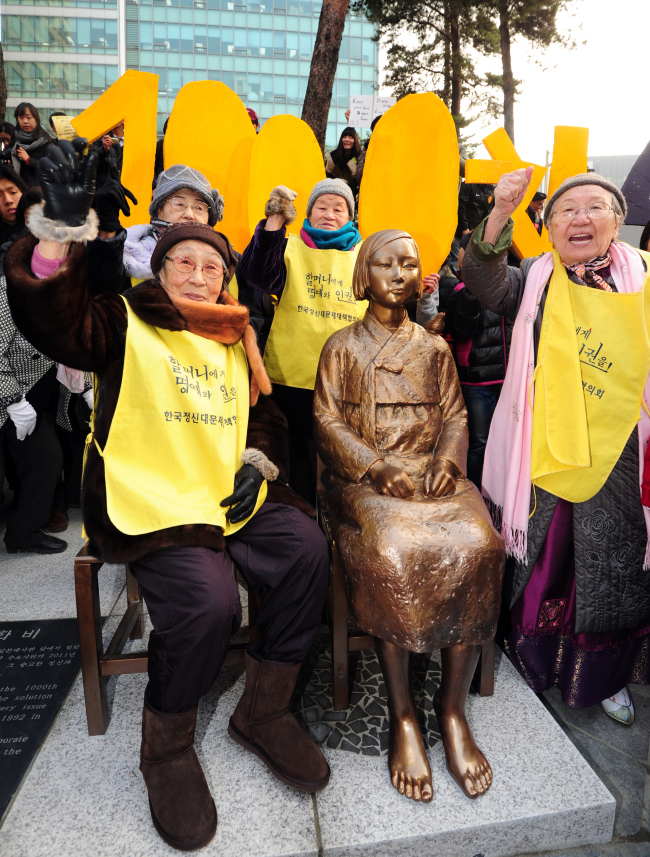Korean court makes unprecedented ruling on compensation for colonial forced labor
Seoul faces another sensitive diplomatic task with Japan after the top court on Thursday recognized the responsibility of two Japanese firms to compensate Koreans forced to work during the colonial period.
Overturning a lower court’s ruling, the Supreme Court made the landmark decision in favor of nine plaintiffs, who have demanded compensation for their forced labor and mental and physical suffering from Mitsubishi Heavy Industries and Nippon Steel Corp.
The ruling runs counter to Seoul’s stance that the victims’ right to claim compensation ended with a broad compensation deal that the two countries signed in 1965 when they reestablished diplomatic ties.
Based on the deal, Tokyo has claimed that issues involving the victims of forced labor and other wartime atrocities have already been settled. Japan’s Chief Cabinet Secretary Osamu Fujimura reiterated the claim on Friday.
Seoul faces another sensitive diplomatic task with Japan after the top court on Thursday recognized the responsibility of two Japanese firms to compensate Koreans forced to work during the colonial period.
Overturning a lower court’s ruling, the Supreme Court made the landmark decision in favor of nine plaintiffs, who have demanded compensation for their forced labor and mental and physical suffering from Mitsubishi Heavy Industries and Nippon Steel Corp.
The ruling runs counter to Seoul’s stance that the victims’ right to claim compensation ended with a broad compensation deal that the two countries signed in 1965 when they reestablished diplomatic ties.
Based on the deal, Tokyo has claimed that issues involving the victims of forced labor and other wartime atrocities have already been settled. Japan’s Chief Cabinet Secretary Osamu Fujimura reiterated the claim on Friday.

The ruling came as public sentiment against Japan has worsened due to its repeated claim to sovereignty over South Korea’s islets of Dokdo, its distortion of historical facts and failure to apologize to those forced into sexual slavery during World War II.
“The government may feel very embarrassed and perplexed as the ruling came amid a pile of thorny bilateral issues. It is apparently a difficult diplomatic issue (for Seoul),” said Park Cheol-hee, professor at the Graduate School of International Studies.
“If it had been a diplomatic decision, then the two countries will have some flexibility over the issue. But it is the top court’s legal decision, which the government cannot say is proper or improper.”
Regarding the ruling, Seoul officials appeared cautious, saying that it was a “civil suit” that does not involve any governments.
“Basically, the compensation issue involving forced laborers during the Japanese colonial period is dealt with in a civil suit. In that regard, the role of the government is limited,” a government official told media.
According to the Seoul government, the number of Koreans who have reported their experience of forced labor from 2005 to 2008 has topped 220,000. Including their bereaved families, the figure is expected to reach 1 million, observers said.
The right to compensation is inherited by their families when they die. Scholars here claim that the number of Koreans forcibly mobilized by Japan from April 1938 until Korea was liberated in 1945 is around 8 million.
After Korea’s appellate court makes a decision on the level of compensation for the nine plaintiffs, they can make the official claim. Should the two firms refuse to make amends, the process to forcibly take away the two firms’ property based in South Korea is to proceed, legal experts said.
Concerning the compensation matters, the Seoul government’s basic position is that the 1965 pact covers every issue except for those involving those forced into sexual slavery; those hurt during the atomic bombing of Japan; and those forced to move to the freezing island of Sakhalin in Russia to work during the colonial rule.
As Seoul has raised its voice about human rights issues in recent months, experts said that it may feel growing pressure to take due measures to address the wartime victims.
“As Seoul has the legal grounds now to support the victims, chances are high that the Seoul government will be more active in dealing with these issues,” said Kim Soung-chul, senior fellow at the local think tank Sejong Institute.
“As the international community is watching Seoul with expectation (about its efforts for human rights), Seoul may take due action.”
On such sensitive issues, South Korea had apparently taken a low-key stance to avoid straining ties with Japan. Since earlier this year, however, it has worked more aggressively to address them, including the issue of the so-called comfort women.
The Constitutional Court in Seoul ruled on Aug. 30 that it was a violation of victims’ human rights that the government did not proactively engage in efforts to resolve the issues surrounding the wartime victims.
Last December, President Lee pressed his Japanese counterpart to address the issue, underscoring that the issue has been a stumbling block in the way of the two nations working toward a “mature, future-oriented” relationship.
Japan has argued that the issue was settled under the 1965 bilateral pact, while Seoul maintains that comfort women issues are separate from the deal and should be dealt with from a humanitarian standpoint.
By Song Sang-ho (sshluck@heraldcorp.com)
-
Articles by Korea Herald



















